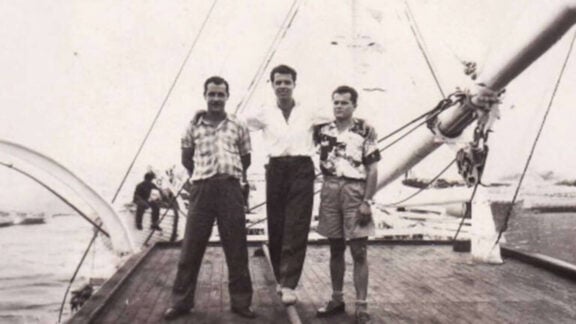1. PONTIANS
Pontians survived persecution under the Turkish yoke, showed courage and gave future generations lessons on the value of Freedom. They have a reputation for being honest and hardworking, but for some unapparent reason are mocked in Greek jokes. For example, why does a Pontian wife have a washing machine? Answer: So that she can balance the scrubbing board on them.
2. CRETANS
A vivacious lot, they are made up of different races and influences from Dorians, Egyptians, Byzantines, Arabs, Venetians and Turks. At the crossroads of the Mediterranean Sea, different cultures have passed through this beautiful island. Christianity is important in the lives of Cretans. They play as hard as they work, and enjoy traditional lives with family and relatives. Family loyalty is important and the family honour code is practised, and it can lead to heated arguments and fights. In the past, there have been many family vendettas. They are known for their fun-loving ways, courage (as could be seen in wars) and hospitality. Fun family occasions are usually accompanied by gun shooting. Sometimes people get hurt.
3. CORFIOTS
Fun-loving and known for being a little bit crazy, Corfiots are always making jokes. They are talented musicians, and it seems that all Corfiots can play a musical instrument, but those who don’t enjoy a good song.
4. GREEKS OF CONSTANTINOPLE
Cosmopolitan people shaped by the colours and beauties of a mystical city which once was filled with Greeks. Aware of the Byzantine era and their glorious past, they sometimes tend to dwell on it. They will never forget their homeland, roots and ancestral heritage and the pain of leaving Istanbul and racism they faced in Greece amongst their fellow compatriots who called them ‘Turkish’ despite their acquisition of the Greek language, religion and culture under difficult circumstances. They are also famed for their exquisite cuisine with many spices and Middle Eastern influences.
READ MORE: Top 10: My big fat Greek virtual date
5. KEFALONIANS
Kefalonia, an underrated Greek island, is filled with beautiful scenery. The people are shrewd and have a reputation for being stubborn and bearing grudges. One grudge they bear is against the islanders from nearby Ithaki, which claims to be the island of Odysseus. The Kefalonians believe that Odysseus was actually a Kefalonian.
6. PIRAEUS
It used to be a city in its own right, but it grew and is practically connected to Athens. Despite this, there’s a different vibe which is a little grungy. A port area, there are plenty of comings and goings with much of the population involved in the maritime industry. There are seedy parts of the town with dark comings and goings. Tougher than Athenians, the people of Piraeus are working class people who pride themselves on their down-to-earth street-smart nature and traditional values.
7. KATO APO TO AVLAKI
An ‘avlaki’ is a dry runway which isn’t contained. In this case, it is the Corinthian Canal which separates the Peloponnese from the rest of Greece. The behaviour of the Peloponnesians is a little rougher than their counterparts. Proud Greeks, it is from this region of Greece that the Greek Revolution against the Ottoman empire began. Heroic but a little wild, they are the Sicilians of Greece and are viewed as somewhat rowdy by the rest of Greece.
8. MANI
Maniots or Maniates live in the picturesque but ragged Mani Peninsula in the southern Peloponnese, Greece. The name ‘Mani’ is thought to have originally meant ‘dry’ or ‘barren’. Described as descendants of the ancient Dorian population of the Peloponnese, they have a reputation being fierce and proudly independent warriors. Many of their lot were pirates because their lands were barren and they considered piracy a legitimate way to secure income. They lived in fortified towers and defended their lands against the armies of William II Villehardouin and the invaders of the Ottoman Empire. There are many superstitions surrounding the Mani culture which include witches, demons, vampires and ghosts, and part of their lands are still believed to be possessed by demons. They also practice vendettas, aimed at wiping out rival families. When embroiled in a vendetta, families would lock themselves in their towers. These could go on for years, and hence the Greek saying, “στο κρατάω Μανιάτικο” (Ι am bearing it as in Mani), alluding to the grudges which Maniots could keep.
READ MORE: Your survival guide to driving in Greece
9. KALAMATA
Apart from their olives, Kalamatiano dance and lovely handkerchiefs, the residents of Kalamata are known for the quality of their hash which produces intense and racy effects. For this reason, the people are traditional but also a little bit on the lawless side.
10. PYRGOS
If Greece had a Texas, it would be Pyrgos. Like the Wild West, the area was uninhabited until the first ruler built a fort with a pyrgos (tower), and hence the name. Pyrgos has a reputation for crime, and they are said to be a loud and rowdy lot.








